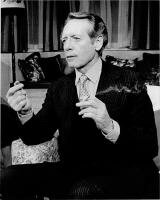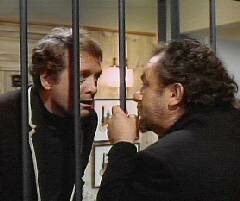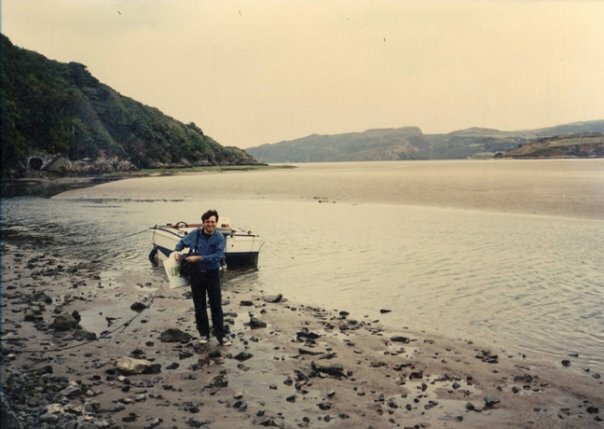McGoohan and Me
MEETING McGOOHAN
BY TOM SOTER

There were three icons in my formative years (ages 12-17): Basil Rathbone, Sean Connery, and Patrick McGoohan. all of them were cool under pressure, all were men of action, and all were (fortunately or unfortunately) role models. Rathbone was, of course, Sherlock Holmes, Connery was James Bond, but McGoohan – well, he was special. He was the "Secret Agent Man," as Johnny Rivers's song put it in Secret Agent (aka Danger Man), he was No. 6 in The Prisoner, who would "not be pushed, filed, stamped, indexed, briefed, debriefed, or numbered," who cried out, defiantly, "I am not a number, I am a free man." For a shy teenager, McGoohan's stubborn defiance of convention was breathtaking. Being McGoohan-like – aloof, taciturn, defiant of conventions – was making the shy guy into the cool dude.
I finally met the Great Man in December 1984. My editor at Video magazine knew of my fascination with McGoohan. The actor was appearing in his first Broadway stage production, Pack of Lies and would be available for an interview.
But there would be restrictions: he would only sit for 15 minutes, and I could not use a tape-recorder unless he okayed it. The interview was to take place on a Monday. I carefully prepared my questions and eagerly anticipated the big day. It came. He didn't. I got a call from his representative: "Mr. McGoohan is terribly sorry, but could he postpone the meeting until Wednesday?" Of course, of course. Wednesday rolled by, but McGoohan, once again, did not. "Mr. McGoohan is terribly sorry, but could he postpone the meeting until Friday?" Naturally, naturally. When Friday came, the call was expected. But this time, the interview was changed to Saturday, and when Saturday rolled around, there was no call of cancellation. I went to the designated meeting place, a dance/rehearsal studio on Broadway and 20th Street. I went in and was told to wait in a dressing room for Mr. McGoohan, who would be with me shortly. Could this be happening? "Excuse me?" said a young man who appeared seemingly from nowhere,"What's your full name?"
I cleared my throat. "Ah, Tom Soter."
The young man nodded and went away. Outside the room, I heard muffled words. Then the young man returned, followed by a towering, wrinkled, slightly stooped figure.
"Mr. Soter, Mr. McGoohan." He was much taller than I expected, over six feet, though the stooped walk covered it. He was clutching a book to his chest, the script for Pack of Lies. His face was lined, his forehead large, his eyes – peering through horn-rimmed glasses – quite blue.
 Pack of Lies: his first and last Broadway show.
Pack of Lies: his first and last Broadway show.
"So, it's about The Prisoner you want to talk?"
"Yes."
He laughed quietly. "Well, I hope I can remember something about it," he quipped, adding: "It puzzled quite a few people, myself included, which was the point."
He stared ahead, a classic enigma wrapped in a riddle, not unlike his character in The Prisoner. He suggested I conduct the interview at a neighborhood coffee shop that he had been eating at regularly during rehearsal breaks for the play. During the walk over, he made small talk. "We're at that awkward stage when you've just learned the lines and therefore haven't been able to do anything with them." He noted, however, that the play was in good shape as a production because it ran for a year in England and didn't need to be rethought. That was good, he added, because he found the challenge of acting in his first Broadway play sufficient. He had not appeared on the stage in over 25 years.
When we entered the restaurant, he nodded "hello" to all the waitresses, who smiled at him as if they knew him. A waitress came over and asked if we were ready. "I know what I want," he said, without consulting the menu. He lit a cigarette and ordered corned beef on rye. He turned to me after I had ordered. I took out my tape-recorder. He hardly seemed to notice it. "Okay?" I asked. He nodded. "Fine, fine." So much for eccentricity. To start off, I admitted to him that I had always been a great fan of his work. He smiled slightly, perhaps pleased, perhaps embarrassed. Then he began talking about fans – about children watching his shows. 
McGoohan, with Leo McKern (right), in The Prisoner.
"That's one of the reasons I didn't want to use excessive violence on Secret Agent or The Prisoner. Television at the time was certainly a guest in the house. I felt that just as someone behaves properly towards a guest, it behooves one in playing on television to behave with a certain amount of – certainly we had fisticuffs and fights in Secret Agent but we certainly never had any sort of violence that would affect a child in any way or offend grandmother." The producers wanted a James Bond-type hero, shooting off quips as rapidly as his gun and hopping into bed with a new girl every week. McGoohan had other ideas, however, and after seeing the first script wrote a long letter to the producer of the series, outlining what his character, John Drake, would and would not do.
"We eventually did it without any of that rubbish in it," he said, and his strong feelings led to the most unusual – and fascinating – secret agent to appear among the 1960s crop of Napoleon Solos, John Steeds, and Simon Templars. "You never saw me fire a gun," he noted proudly. And he never dallied with the damsels. "I said to the producers, 'If I start going with a different girl in each episode, what are those kids going to think out there?"
The conversation went on for 45 minutes, as we ate our lunch and drank our coffee. McGoohan seemed easy-going and unthreatening, like a real person not a TV icon. At one point, he took a drag on his cigarette and stopped talking. The words had seemed to flow out of him; he spoke in that curious mid-Atlantic accent, slurring some words, emphasizing others. He talked about the creation of The Prisoner, the story of one man's fight against a dehumanizing system. McGoohan plays Number Six, a secret agent who resigns his job and is spirited away to a sea town known only as the Village. Everyone has a number instead of a name. "I'd always had these obsessions in the back of my mind for man in isolation, fight against bureaucracy, brainwashing, and numbers," remarked McGoohan. A visit to the Welsh resort town of Portmeirion, with its fairy tale-like buildings, inspired him; a talk with Sir Lew Grade fired him into action. Grade had financed Secret Agent and wanted McGoohan to do another adventure series. "I said, 'I don't want to do anything quite like that. I want to do something different.' He said, 'What?' So I said, 'This.' And I pulled out a script that I had prepared of the first episode of The Prisoner."
He said a lot more, but for me the memorable moments were the ones where he made me feel like a special friend (I'm sure this is an old actor's trick, but for an impressionable fan, it was heaven): when he noted at one point how perceptive I was, more so than most other people, and when he later hinted he might look at something I'd written and give his opinion, or see me in an improv comedy show. I'm sure he meant nothing by any of these things, but they made me feel like his pal. After the meal, as we walked back to his rehearsal studio, I stopped a passerby whom I asked to photograph McGoohan and me. I remember the moment, but even if I didn't, the pleasure and pride and excitement I felt in being with my idol is palpable to anyone looking at the photograph of that moment. Was there ever a greater nerd than me? "It's only a TV show," I want to yell back at that dopey-looking, smirking kid with the silly moustache. But to me then – and, I guess, to me, now and forever – McGoohan and The Prisoner represent a period that I can never recapture but am constantly trying to, a time when I was always 14 and heroes like McGoohan were always there to keep us safe. "I am not a number. I am a person." Indeed.
November 2008
 TS in Portmeirion, Wales, 1990, location for The Prisoner.
TS in Portmeirion, Wales, 1990, location for The Prisoner.